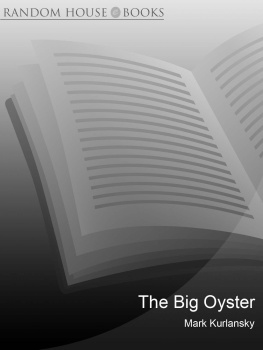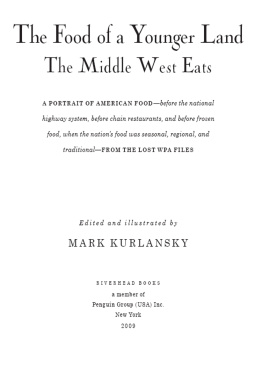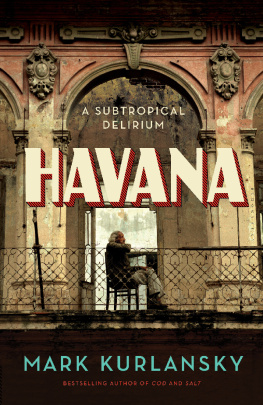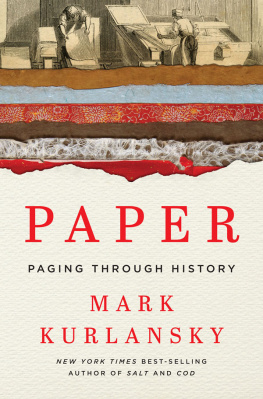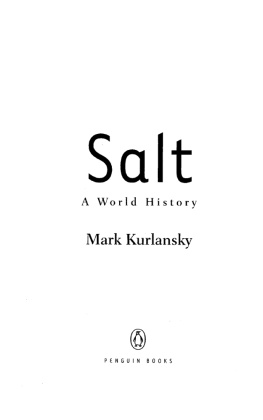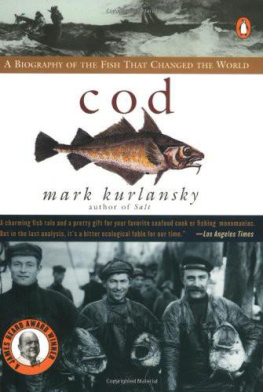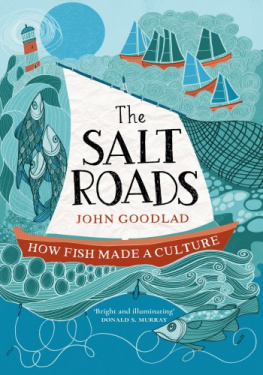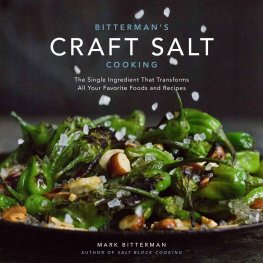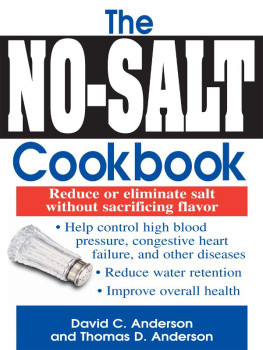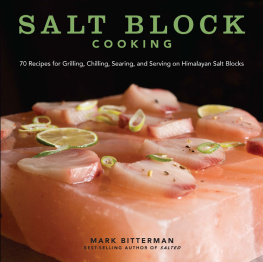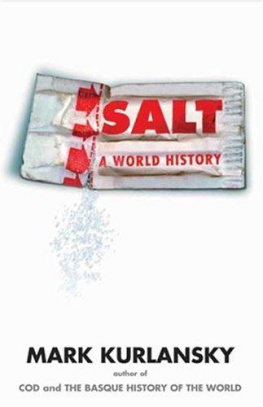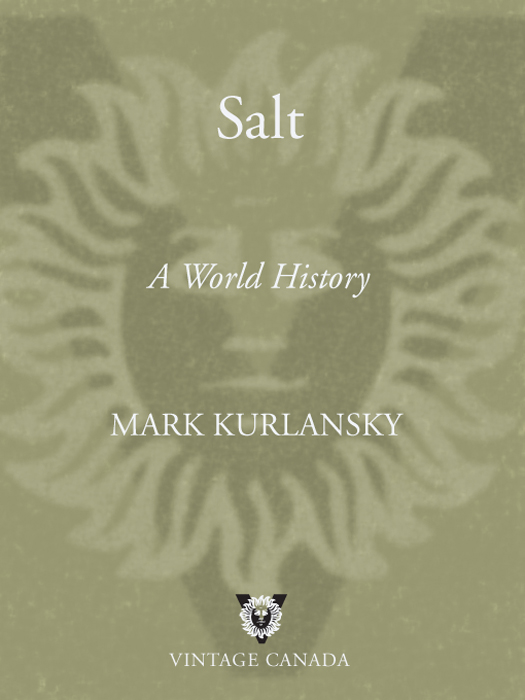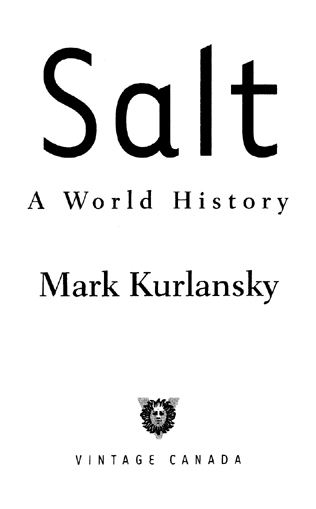Other Books by Mark Kurlansky
The Basque History of the World
Cod: A Biography of the Fish That Changed the World
A Chosen Few: The Resurrection of European Jewry
A Continent of Islands: Searching for the Caribbean Destiny

The White Man in the Tree and Other Stories (fiction)
The Cods Tale (for children)
VINTAGE CANADA EDITION, 2002
Copyright 2002 Mark Kurlansky
All rights reserved under International and Pan-American Copyright Conventions. No part of this book may be reproduced in any form or by any electronic or mechanical means, including information storage and retrieval systems, without permission in writing from the publisher, except by a reviewer, who may quote brief passages in a review.
Published in Canada by Vintage Canada, a division of Random House of Canada Limited, Toronto. Originally published in hardcover in Canada by Alfred A. Knopf Canada, a division of Random House of Canada Limited, Toronto, in 2002, and simultaneously in the United States by Walker Publishing Company, Inc., New York. Distributed by Random House of Canada Limited, Toronto.
Vintage Canada and colophon are registered trademarks of Random House of Canada Limited.
Illustrations on are by the author.
: Kenneth R. Mackenzies translation of Pan Tadeusz by
Adam Mickiewicz used by permission of Hippocrene Books.
N ATIONAL L IBRARY OF C ANADA C ATALOGUING IN P UBLICATION
Kurlansky, Mark
Salt : a world history / Mark Kurlansky.
eISBN: 978-0-307-36979-6
1. SaltHistory. 2. Salt industry and tradeHistory. I. Title.
TN900.K87 2003 553.632 C2002-902799-3
www.saltbook.com
www.randomhouse.ca
v3.1
To my parents, Roslyn Solomon and Philip Mendel
Kurlansky, who taught me to love books and music
and
to Talia Feiga, who opened worlds while she slept in the crook of my arm.
The real price of every thing, what every thing really costs to the man who wants to acquire it, is the toil and trouble of acquiring it.
Adam Smith, The Wealth of Nations, 1776
All our invention and progress seem to result in endowing material forces with intellectual life, and in stultifying human life into a material force. Karl Marx, speech, 1856
Dreams are not so different from deeds as some may think.
All the deeds of men are only dreams at first. Andin the end, their deeds dissolve into dreams.
Theodor Herzl, Old New Land, 1902
Contents
INTRODUCTION

The Rock
I BOUGHT THE rock in Spanish Catalonia, in the rundown hillside mining town of Cardona. An irregular pink trapezoid with elongated, curved indentations etched on its surface by raindrops, it had an odd translucence and appeared to be a cross between rose quartz and soap. The resemblance to soap came from the fact that it dissolved in water and its edges were worn smooth like a used soap bar.
I paid too much for itnearly fifteen dollars. But it was, after all, despite a rosy blush of magnesium, almost pure salt, a piece of the famous salt mountain of Cardona. The various families that had occupied the castle atop the next mountain had garnered centuries of wealth from such rock.
I took it home and kept it on a windowsill. One day it got rained on, and white salt crystals started appearing on the pink. My rock was starting to look like salt, which would ruin its mystique. So I rinsed off the crystals with water. Then I spent fifteen minutes carefully patting the rock dry. By the next day it was sitting in a puddle of brine that had leached out of the rock. The sun hit the puddle of clear water. After a few hours, square white crystals began to appear in the puddle. Solar evaporation was turning brine into salt crystals.
For a while it seemed I had a magical stone that would perpetually produce brine puddles. Yet the rock never seemed to get smaller. Sometimes in dry weather it would appear to completely dry out, but on a humid day, a puddle would again appear under it. I decided I could dry out the rock by baking it in a small toaster oven. Within a half hour white stalactites were drooping from the toaster grill. I left the rock on a steel radiator cover, but the brine threatened to corrode the metal. So I transferred it to a small copper tray. A green crust formed on the bottom, and when I rubbed off the discoloration, I found the copper had been polished.
My rock lived by its own rules. When friends stopped by, I told them the rock was salt, and they would delicately lick a corner and verify that it tasted just like salt.
Those who think a fascination with salt is a bizarre obsession have simply never owned a rock like this.

A MONG THE PEOPLE who have apparently lived with such deprivation was the Welsh Jungian psychologist Ernest Jones, friend of Sigmund Freud and a leading force in bringing psychoanalysis to Britain and the United States. In 1912, Jones published an essay about the human obsession with salta fixation that he found irrational and subconsciously sexual. To support his theory, he cited the curious Abyssinian custom of presenting a piece of rock salt to a guest, who would then lick it.
Jones states that in all ages salt has been invested with a significance far exceeding that inherent in its natural properties, interesting and important as these are. Homer calls it a divine substance, Plato describes it as especially dear to the Gods, and we shall presently note the importance attached to it in religious ceremonies, covenants, and magical charms. That this should have been so in all parts of the world and in all times shows that we are dealing with a general human tendency and not with any local custom, circumstance or notion.
Salt, Jones argued, is often associated with fertility. This notion may have come from the observation that fish, living in the salty sea, have far more offspring than land-based animals. Ships carrying salt tended to be overrun by mice, and for centuries it was believed that mice could reproduce without sex, simply by being in salt.
The Romans, Jones pointed out, called a man in love salax, in a salted state, which is the origin of the word salacious. In the Pyrenees, bridal couples went to church with salt in their left pockets to guard against impotence. In some parts of France, only the groom carried salt, in others only the bride. In Germany, the brides shoes were sprinkled with salt.
Jones further built his case: Celibate Egyptian priests abstained from salt because it excited sexual desire; in Borneo, when Dayak tribesmen returned from taking heads, the abstinence from both sex and salt was required; when a Pima killed an Apache, both he and his wife abstained from sex and salt for three weeks. In Behar, India, Nagin women, sacred prostitutes known as wives of the snake god, periodically abstained from salt and went begging. Half their proceeds were given to the priests and half to buying salt and sweetmeats for the villagers.


